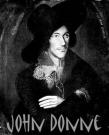
A Young John Donne
John Donne (1572 -1631)
John Donne (pronounced "Dun" or "Done") was born in London, England between January 24 and June 19 of 1572. He was a metaphysical poet, a writer, a priest, a husband, and a father. His works include love poetry, sermons and religious poems, Latin translations, epigrams, elegies, songs and sonnets.
Donne was born into a Roman Catholic family in a time when Catholics were harassed and were given financial penalties by the ruling government of Anglicans. His father (John, who was a hardware merchant) died when he was only 4 years old, but his mother, (Elizabeth, the daughter of dramatist and writer John Heywood and also the granddaughter of Sir Thomas More's sister) remarried 6 months later a physician, Dr. John Syminges.
Donne's first teachers were Jesuits. At the age of 11, Donne entered Hart Hall Oxford (known today as University of Oxford). He left Oxford in 1587 without a degree, because he would not swear to the oath for the Act of Supremacy: the oath asserted that Queen Elizabeth was the head of the Church in England. Donne's first biographer, Izaak Walton, says that Donne studied a few years at Cambridge, but it was said that no records survived to prove this. His step-father died in 1588, which is around the time he was maybe at Cambridge. Donne's mother married for the third time in 1591 to Richard Rainsford. Donne also in 1591studied law in the Lincoln's Inns of Court, which were the schools of law at this time in England, until he left in 1595. He didn't study law for a profession, but rather for the languages and learning. The following year he volunteered his service to the Earl of Essex as a soldier against the Spanish. He was accepted and sailed on two expeditions in 1596 and 1597. This is when he wrote his verse epistles, "The Storm" and "The Calm."
In 1597 Donne became secretary to Sir Thomas Egerton, Lord Keeper of the Great Seal, but after his secret marriage to Sir Thomas's niece, Ann More, in 1601 was discovered he was fired and imprisoned. Donne and his wife lived many of their years together with little money. They brought 12 children into the world, but 2 were stillborn. Donne was ordained as a deacon and priest in the Church of England in January 1615 and was appointed Chaplain to King James. He started preaching to small parish churches, but also at Court by April 1616. Donne's wife Anne died in August 15, 1617 after the complications of the birth of a stillborn child. The loss of his wife was extremely upsetting and he expressed this through the "Holy Sonnet", which begins "Since she whom I loved," written shortly after Ann's death.
In 1619 King James sent Donne as chaplain with Viscount Doncaster on his ambassadorial mission to Germany. Donne left England and his children reluctantly and in the "Hymn to Christ at the Author's Last Going into Germany" you can see this. Donne returned to London January, 1620 and a year later was appointed Dean of Saint Paul's Cathedral, the position he held until his death. Donne was then financially secure and it was said that he did not mind sharing his wealth.
In March, 1625 King James died and Donne was called to preach the first sermon to new king, Charles I. He also preached on April 26 a tribute to King James before his burial. That summer the plague broke out in London and he performed many sermons. There were many deaths of Donne's friends and family during 1627 and 1628, which saddened him. One death was his eldest daughter Lucy. Donne continued preaching during 1629 and 1630 at various places. Donne visited his daughter Constance in the summer of 1630 and came down with a fever. He had to stay with her for several months. Donne wrote out his will in December, 1630. In January, 1631 his mother died while he was away and her funeral preceded his return to London.
Donne looked terrible on his return. It is said by Izaak Walton that Donne's physician, Dr. Simeon Fox, prescribed milk for twenty days. After ten days Donne quit drinking it, telling his Doctor that he didn't like milk and only drank it to please Fox, and that he would drink anymore, not even if it guaranteed him twenty more years of life. Donne preached his last sermon on February 25, 1631. It was said to be like he was preaching at his own funeral, which was published after his death as "Death's Duel." Donne died a few weeks later in London on March 31, 1631 and was buried in St. Paul's on April 3. The "Hymne to God, my God, In my Sicknesse," was the last thing Donne wrote before dead.
Back to Explication
Sources for this
document can be found under Citations
Web Design by Patricia Chatters